4 mar 2016
company supports violations of rights of Palestinian children including their routine torture in Israeli jails. This is an important decision in accordance with the values of human and children’s rights espoused by UNICEF. We urge the United Nations, its Secretary General Ban Ki Moon and all UN agencies contracting G4S worldwide to follow the lead of UNICEF and UNHCR in Jordan and immediately end their contracts with G4S.”
“We welcome this news and congratulate Jordan BDS for their persistence and hard work. We salute all campaigners around the world involved in the Stop G4S campaign,” Mussa added, according to the PNN.
Over the past year, campaigners have been urging the UN and its agencies to end their contracts with G4S over its complicity in Israel’s regime of settler colonialism, occupation and apartheid.
G4S, which is a large British security company, provides equipment and services to Israeli prisons at which Palestinian political prisoners, including children, are held without trial and subjected to torture.
According to the BDS Movement website, “by helping Israel to run prisons and “interrogation centres”, G4S is participating in Israel’s use of torture and mass incarceration of more than 6,000 Palestinians as a way to discourage Palestinians from resisting Israel’s regime of occupation, settler-colonialism and apartheid.”
G4S also has contracts with the Israeli government to provide equipment and services to checkpoints and the apartheid wall, as well as crossings that enforce the siege of Gaza.
It was also involved in the construction of a 23 hectares Training Center for the Israeli Police, which it will help to run.
G4S has provided services to various UN agencies in Jordan including UNICEF and UNHCR, both of whom no longer have contracts with occupation and apartheid profiteer G4S.
UNICEF’s decision comes after a year-long concerted and creative campaign which included meetings, letters, protests and social media actions that called upon the UN and its agencies both locally and internationally to end its contracts with G4S, worth $22 million globally, due to the firm’s complicity in Israeli human rights abuses.
Other UN bodies in Jordan including United Nations Development Program (UNDP), World Food Program (WFP), and United Nations Office for Project Services (UNOPS) still have contracts with the firm.
Last month, a Jordanian coalition formed to defend the political prisoner, administrative detainee and hunger striker Mohammad Al-Qeeq, demonstrated outside UN offices in Amman.
The coalition submitted a statement that was signed by 58 Jordanian organizations, unions and major political parties t demanding the UN to intervene to save the life of Al-Qeeq and as well as to end its contracts with the security firm G4S for its role in the Israeli occupation.
A report approved by the UN General Assembly in 2012 by the UN special rapporteur on Palestine, Richard Falk, urged a boycott of G4S over its role in Israeli human rights violations.
Yazid Halaseh, member of the Jordan BDS movement, said:
“We are delighted by this news. We will continue campaigning to demand an end to all UN agency contracts with G4S until the firm stops profiting from occupation and apartheid. The United Nations should simply ban this notorious firm from its procurement process because it is profiting from the Israeli settler-colonial project, ethnic cleansing of the Palestinians and apartheid policies. These are all violations of UN resolutions, basic principles of human rights and international law.”
“We welcome this news and congratulate Jordan BDS for their persistence and hard work. We salute all campaigners around the world involved in the Stop G4S campaign,” Mussa added, according to the PNN.
Over the past year, campaigners have been urging the UN and its agencies to end their contracts with G4S over its complicity in Israel’s regime of settler colonialism, occupation and apartheid.
G4S, which is a large British security company, provides equipment and services to Israeli prisons at which Palestinian political prisoners, including children, are held without trial and subjected to torture.
According to the BDS Movement website, “by helping Israel to run prisons and “interrogation centres”, G4S is participating in Israel’s use of torture and mass incarceration of more than 6,000 Palestinians as a way to discourage Palestinians from resisting Israel’s regime of occupation, settler-colonialism and apartheid.”
G4S also has contracts with the Israeli government to provide equipment and services to checkpoints and the apartheid wall, as well as crossings that enforce the siege of Gaza.
It was also involved in the construction of a 23 hectares Training Center for the Israeli Police, which it will help to run.
G4S has provided services to various UN agencies in Jordan including UNICEF and UNHCR, both of whom no longer have contracts with occupation and apartheid profiteer G4S.
UNICEF’s decision comes after a year-long concerted and creative campaign which included meetings, letters, protests and social media actions that called upon the UN and its agencies both locally and internationally to end its contracts with G4S, worth $22 million globally, due to the firm’s complicity in Israeli human rights abuses.
Other UN bodies in Jordan including United Nations Development Program (UNDP), World Food Program (WFP), and United Nations Office for Project Services (UNOPS) still have contracts with the firm.
Last month, a Jordanian coalition formed to defend the political prisoner, administrative detainee and hunger striker Mohammad Al-Qeeq, demonstrated outside UN offices in Amman.
The coalition submitted a statement that was signed by 58 Jordanian organizations, unions and major political parties t demanding the UN to intervene to save the life of Al-Qeeq and as well as to end its contracts with the security firm G4S for its role in the Israeli occupation.
A report approved by the UN General Assembly in 2012 by the UN special rapporteur on Palestine, Richard Falk, urged a boycott of G4S over its role in Israeli human rights violations.
Yazid Halaseh, member of the Jordan BDS movement, said:
“We are delighted by this news. We will continue campaigning to demand an end to all UN agency contracts with G4S until the firm stops profiting from occupation and apartheid. The United Nations should simply ban this notorious firm from its procurement process because it is profiting from the Israeli settler-colonial project, ethnic cleansing of the Palestinians and apartheid policies. These are all violations of UN resolutions, basic principles of human rights and international law.”
3 mar 2016
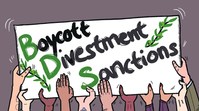
Palestinian BDS National Committee (BNC) announced on Tuesday, March 1st, launching events for the Israeli Apartheid Week in Gaza Strip, which coincides the first of March of every year.
The events, organized in Palestine and 250 other countries around the world, emphasize the Palestinian right of resisting the occupation.
Boycott. Divestment. Sanctions. (BDS)
Abdulrahman Abu Nahel, Gaza coordinator of the Palestinian BDS National Committee, said, “We will focus on all aspects of BDS that aim to isolate the Israeli occupation academically, culturally, and militarily.”
Abu Nahel pointed out that Palestinian and foreign activists in Canada started the Israeli Apartheid Week in 2005 in response to the demands of the Palestinian civil society. Since then, the annual week has become the most noticeable stance of solidarity with the Palestinian people, highlighting the real image of Israel.
Abu Nahel mentioned that the events are now organized in more than 250 cities. The events, according to him, are staged in most parts of historical Palestine and they started in Europe a few days ago and are going to be launched in the coming few days in the Arab countries, the US, Africa, and Latin America.
He stated that the events include movies, seminars, group discussions, and innovative activities on the Palestinian cause. There will also be messages and speeches delivered by some prominent activists and political figures. There will be seminars organized with the participation of Rania Masri, from the Lebanese Campaign to Boycott Supporters of Israel in Lebanon.
In cooperation with the secretary general of the National Democratic Alliance, Awad Abdel Fattah, from Masarat Center, a seminar will be held on the role of the Palestinians in the territories of 1948 in the Palestinian struggle. The film of “The Wanted 18” will be the concluding event of the Week.
Popular support
Regarding the message of the boycotts and the marches that were launched a few days ago in Ramallah, Abu Nahel stressed that this underlines the Palestinian popular support for the BDS.
When asked about the objectives the BDS movement is looking for, Abu Nahel said, “We seek to empower our people to practice their right of self-determination, through ending the Israeli occupation of the Palestinian lands and dismantling the Apartheid Wall and settlements.” “We are hoping to put an end for the Israeli discrimination practiced on the Palestinians of the 1948, and to return the Palestinian refugees to their homes,” he added.
Isolating Israel
Abu Nahel pointed out that the BDS has become a strategic danger facing the Israeli occupation. He mentioned the financial damage, up to $14 billion, that Veolia Corporation has faced since the beginning of the BDS movement in 2005, as one of the biggest achievements of BDS.
The French telecoms Orange has also terminated its relationship with the Israeli company Partner Communications, he continued.
Abu Nahel also mentioned the US Methodist Church's recent decision to divest from five Israeli banks, and the increasing number of institutions and figures that support the BDS.
The events, organized in Palestine and 250 other countries around the world, emphasize the Palestinian right of resisting the occupation.
Boycott. Divestment. Sanctions. (BDS)
Abdulrahman Abu Nahel, Gaza coordinator of the Palestinian BDS National Committee, said, “We will focus on all aspects of BDS that aim to isolate the Israeli occupation academically, culturally, and militarily.”
Abu Nahel pointed out that Palestinian and foreign activists in Canada started the Israeli Apartheid Week in 2005 in response to the demands of the Palestinian civil society. Since then, the annual week has become the most noticeable stance of solidarity with the Palestinian people, highlighting the real image of Israel.
Abu Nahel mentioned that the events are now organized in more than 250 cities. The events, according to him, are staged in most parts of historical Palestine and they started in Europe a few days ago and are going to be launched in the coming few days in the Arab countries, the US, Africa, and Latin America.
He stated that the events include movies, seminars, group discussions, and innovative activities on the Palestinian cause. There will also be messages and speeches delivered by some prominent activists and political figures. There will be seminars organized with the participation of Rania Masri, from the Lebanese Campaign to Boycott Supporters of Israel in Lebanon.
In cooperation with the secretary general of the National Democratic Alliance, Awad Abdel Fattah, from Masarat Center, a seminar will be held on the role of the Palestinians in the territories of 1948 in the Palestinian struggle. The film of “The Wanted 18” will be the concluding event of the Week.
Popular support
Regarding the message of the boycotts and the marches that were launched a few days ago in Ramallah, Abu Nahel stressed that this underlines the Palestinian popular support for the BDS.
When asked about the objectives the BDS movement is looking for, Abu Nahel said, “We seek to empower our people to practice their right of self-determination, through ending the Israeli occupation of the Palestinian lands and dismantling the Apartheid Wall and settlements.” “We are hoping to put an end for the Israeli discrimination practiced on the Palestinians of the 1948, and to return the Palestinian refugees to their homes,” he added.
Isolating Israel
Abu Nahel pointed out that the BDS has become a strategic danger facing the Israeli occupation. He mentioned the financial damage, up to $14 billion, that Veolia Corporation has faced since the beginning of the BDS movement in 2005, as one of the biggest achievements of BDS.
The French telecoms Orange has also terminated its relationship with the Israeli company Partner Communications, he continued.
Abu Nahel also mentioned the US Methodist Church's recent decision to divest from five Israeli banks, and the increasing number of institutions and figures that support the BDS.
2 mar 2016
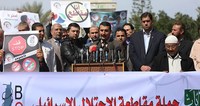
Scores of Palestinian citizens on Wednesday morning rallied in the Gaza City's Unknown Soldier Square to call for a comprehensive economic boycott against Israel.
Some banners carried by the participants called for boycotting Israel economically in general and some of them read, "They kill us with our money" and "Do not pay for the bullets used to kill us."
The rally was called for by the federation of trade unions, which declared its launch of an all-out Palestinian campaign to boycott Israel.
Head of the campaign Sa'ed Ayesh told a news conference during the picket that the campaign would aim to increase the boycott activities against Israel and expose its plots and attempts to destabilize the Palestinian economy.
Ayesh added that the campaign would rally support for local products so as to boost the national economy and promote the spirit of collective participation in boycotting Israel at both international and local levels.
He urged all countries and organizations, which have relations with Israel, to revoke their partnership agreements with Israel in light of its persistent violation of the international law and human rights.
For his part, head of the federation of trade union Sami al-Amsi told the Palestinian Information Center (PIC) that the volume of trade exchange between Gaza and Israel is something close to $3 billion per year.
Amsi, who is also member of the boycott campaign, affirmed that the impact of the campaign would deal a blow to Israel if it achieved its goals.
Some banners carried by the participants called for boycotting Israel economically in general and some of them read, "They kill us with our money" and "Do not pay for the bullets used to kill us."
The rally was called for by the federation of trade unions, which declared its launch of an all-out Palestinian campaign to boycott Israel.
Head of the campaign Sa'ed Ayesh told a news conference during the picket that the campaign would aim to increase the boycott activities against Israel and expose its plots and attempts to destabilize the Palestinian economy.
Ayesh added that the campaign would rally support for local products so as to boost the national economy and promote the spirit of collective participation in boycotting Israel at both international and local levels.
He urged all countries and organizations, which have relations with Israel, to revoke their partnership agreements with Israel in light of its persistent violation of the international law and human rights.
For his part, head of the federation of trade union Sami al-Amsi told the Palestinian Information Center (PIC) that the volume of trade exchange between Gaza and Israel is something close to $3 billion per year.
Amsi, who is also member of the boycott campaign, affirmed that the impact of the campaign would deal a blow to Israel if it achieved its goals.
29 feb 2016
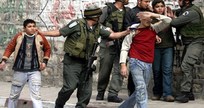
Avaaz international human rights organization called on Hollywood's Oscar nominees to visit Palestinian children in Israeli jails and to speak up for their infringed rights.
“This week’s Oscars are our chance to draw attention to the 500 Palestinian children who are suffering out of sight in Israeli prisons right now,” Avaaz said.
“Israel aims to get good publicity by offering a paid trip for all Oscar winners. But if enough of us come together now, we can publicly invite the stars to visit imprisoned Palestinian children too, and get that story all over the world’s media.”
According to the organization, more than 500 Palestinian children are imprisoned by Israel right now and many of them endure terrible abuse like beatings and harassment. “Most people around the world don’t know anything about their plight. But we have a rare opportunity to tell the world about Palestine’s imprisoned stars — its children,” it added.
The group warned that the Israeli government is offering a $55,000 trip to Israel for Oscar winners, trying to use celebrities’ fame to whitewash its image in the eyes of the world. “But if thousands of us invite the stars to visit Palestine as well to learn about our child prisoners, then we can make this the story and create a media storm in Hollywood,” Avaaz further stated.
The organization said Israel wants to use the endorsement of some of the world’s biggest celebrities to restore its international clout. “They want to hide the ugly face of the occupation behind photos of Hollywood stars on Tel Aviv beaches. The stars will be given an all expenses paid journey so that they can paint a rosy picture of Israel — and Palestinians will be hidden from sight,” Avaaz said.
“This propaganda trip could become a win for the struggle for freedom and dignity in Palestine. We can show the world what happens to Palestine’s future stars, the children, who have their dreams shattered by Israel’s imprisonment policies. It’s impossible to see a child in prison and think they deserve their long sentence, or meet their family and remain indifferent,” the statement further read.
“A free Palestine is within sight, but like the fight against Apartheid in South Africa, it will take international pressure to win,” Avaaz concluded as it urged activists around the world to sign an online petition to urge Hollywood stars to pop in the occupied Palestinian territories.
“This week’s Oscars are our chance to draw attention to the 500 Palestinian children who are suffering out of sight in Israeli prisons right now,” Avaaz said.
“Israel aims to get good publicity by offering a paid trip for all Oscar winners. But if enough of us come together now, we can publicly invite the stars to visit imprisoned Palestinian children too, and get that story all over the world’s media.”
According to the organization, more than 500 Palestinian children are imprisoned by Israel right now and many of them endure terrible abuse like beatings and harassment. “Most people around the world don’t know anything about their plight. But we have a rare opportunity to tell the world about Palestine’s imprisoned stars — its children,” it added.
The group warned that the Israeli government is offering a $55,000 trip to Israel for Oscar winners, trying to use celebrities’ fame to whitewash its image in the eyes of the world. “But if thousands of us invite the stars to visit Palestine as well to learn about our child prisoners, then we can make this the story and create a media storm in Hollywood,” Avaaz further stated.
The organization said Israel wants to use the endorsement of some of the world’s biggest celebrities to restore its international clout. “They want to hide the ugly face of the occupation behind photos of Hollywood stars on Tel Aviv beaches. The stars will be given an all expenses paid journey so that they can paint a rosy picture of Israel — and Palestinians will be hidden from sight,” Avaaz said.
“This propaganda trip could become a win for the struggle for freedom and dignity in Palestine. We can show the world what happens to Palestine’s future stars, the children, who have their dreams shattered by Israel’s imprisonment policies. It’s impossible to see a child in prison and think they deserve their long sentence, or meet their family and remain indifferent,” the statement further read.
“A free Palestine is within sight, but like the fight against Apartheid in South Africa, it will take international pressure to win,” Avaaz concluded as it urged activists around the world to sign an online petition to urge Hollywood stars to pop in the occupied Palestinian territories.
27 feb 2016
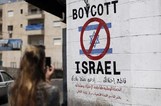
US President Barack Obama this week signed into law a sweeping trade agreement that protects Israel from boycott, divestment, and sanctions (BDS) by countries who oppose the ongoing military occupation of Palestinians.
The agreement -- H.R. 644: Trade Facilitation and Trade Enforcement Act of 2015 -- was passed 75-20 in the Senate on Feb. 11 and later signed into law by the president on Feb. 24.
The agreement reiterates that US Congress “opposes politically motivated actions that penalize or otherwise limit commercial relations specifically with Israel,” referring directly to BDS activities.
The act also cites that congress “supports efforts” to prevent international organizations or governments from carrying out investigation or prosecution of US citizens who do business with “Israel, with Israeli entities, or in any territory controlled by Israel.”
The provision in effect allows US citizens immunity from conducting trade with illegal Israeli settlements, while its terminology fails to distinguish Israeli settlements from the state of Israel.
This terminology violates the US’ official line against settlements in occupied East Jerusalem and the West Bank. But, the White House earlier this month said: “As with any bipartisan compromise legislation, there are provisions in this bill that we do not support.”
Despite the contravention, the White House said that Obama would sign the agreement into law “to help strengthen enforcement of the rules and level the playing field for American workers and businesses.”
The US government opposes the BDS movement against Israel, and while US law requires that products made in illegal Israeli settlements may not be labeled “Made in Israel,” the law is rarely enforced.
The BDS movement aims to exert political and economic pressure over Israel's occupation of the Palestinian territories in a bid to repeat the success of the campaign which ended apartheid in South Africa.
Israel has been struggling to tackle a growing Palestinian-led boycott campaign which has had a number of high-profile successes abroad.
Moves inside the US -- Israel’s longstanding ally and number one provider of military aid -- to criminalize BDS have been slammed by human rights defenders as a violation of free speech.
A similar trend ran through the UK earlier this month following British proposals to forbid a boycott of Israeli settlement goods by publicly-funded British institutions.
Rafeef Ziadah, a spokesperson for the UK branch of the Palestinian BDS National Committee, slammed Britain's proposed regulation.
"By undermining local democracy in service of Israel, David Cameron is standing on the wrong side of history, just as Margaret Thatcher did with her support for apartheid South Africa," Ziadah said.
The agreement -- H.R. 644: Trade Facilitation and Trade Enforcement Act of 2015 -- was passed 75-20 in the Senate on Feb. 11 and later signed into law by the president on Feb. 24.
The agreement reiterates that US Congress “opposes politically motivated actions that penalize or otherwise limit commercial relations specifically with Israel,” referring directly to BDS activities.
The act also cites that congress “supports efforts” to prevent international organizations or governments from carrying out investigation or prosecution of US citizens who do business with “Israel, with Israeli entities, or in any territory controlled by Israel.”
The provision in effect allows US citizens immunity from conducting trade with illegal Israeli settlements, while its terminology fails to distinguish Israeli settlements from the state of Israel.
This terminology violates the US’ official line against settlements in occupied East Jerusalem and the West Bank. But, the White House earlier this month said: “As with any bipartisan compromise legislation, there are provisions in this bill that we do not support.”
Despite the contravention, the White House said that Obama would sign the agreement into law “to help strengthen enforcement of the rules and level the playing field for American workers and businesses.”
The US government opposes the BDS movement against Israel, and while US law requires that products made in illegal Israeli settlements may not be labeled “Made in Israel,” the law is rarely enforced.
The BDS movement aims to exert political and economic pressure over Israel's occupation of the Palestinian territories in a bid to repeat the success of the campaign which ended apartheid in South Africa.
Israel has been struggling to tackle a growing Palestinian-led boycott campaign which has had a number of high-profile successes abroad.
Moves inside the US -- Israel’s longstanding ally and number one provider of military aid -- to criminalize BDS have been slammed by human rights defenders as a violation of free speech.
A similar trend ran through the UK earlier this month following British proposals to forbid a boycott of Israeli settlement goods by publicly-funded British institutions.
Rafeef Ziadah, a spokesperson for the UK branch of the Palestinian BDS National Committee, slammed Britain's proposed regulation.
"By undermining local democracy in service of Israel, David Cameron is standing on the wrong side of history, just as Margaret Thatcher did with her support for apartheid South Africa," Ziadah said.
26 feb 2016

Cameron describes East Jerusalem as "shocking"
Secretary of State John Kerry, on Wednesday, urged Israeli and Palestinian officials to resume a “genuine” peace process, stressing that continued settlement construction is not helpful.
According to World Bulletin/Al Ray, the top diplomat warned of a “downward spiral” in violence in the absence of an active process.
In order to dampen the uptick in violence, Kerry said it was imperative to have a process that people “can grab onto and understand with respect to the creation of a state.”
“If that can happen, then I think it's possible to have progress, but you know, it's not in our hands,” he told a congressional committee, acknowledging difficulties in gaining momentum on all sides of the conflict. "I don't think that the situation is helped by additional settlement construction and building," he added.
In related news, British Prime Minister David Cameron severely criticized the Netanyahu government's policy and said that construction in east Jerusalem settlements is "genuinely shocking."
The British prime minister was speaking during a parliamentary question period in response to a query from opposition Labor MP Imran Hussain, who asked: "Does the prime minister agree with me that illegal settlements and constructions are a major roadblock that hinder peaceful negotiations?"
Cameron replied: “I am well-known as being a strong friend of Israel, but I have to say the first time I visited Jerusalem and had a proper tour around that wonderful city and saw what has happened with the effective encirclement of occupied East Jerusalem it is genuinely shocking."
He stressed that British government is a supporter of Israel, but it does not support the illegal settlements. He explained that they do not support what is happening in east Jerusalem and that it is very important to maintain Jerusalem in the way it was in the past.
Haaterz reported that senior Israeli officials noted that his criticism may have been meant to balance his government's recent decision against boycotts of Israel. The UK has been reported to give over £6billion to Israel, annually, in aid, and a similar amount in arms -- over twice the official figure attributed to the US.
Secretary of State John Kerry, on Wednesday, urged Israeli and Palestinian officials to resume a “genuine” peace process, stressing that continued settlement construction is not helpful.
According to World Bulletin/Al Ray, the top diplomat warned of a “downward spiral” in violence in the absence of an active process.
In order to dampen the uptick in violence, Kerry said it was imperative to have a process that people “can grab onto and understand with respect to the creation of a state.”
“If that can happen, then I think it's possible to have progress, but you know, it's not in our hands,” he told a congressional committee, acknowledging difficulties in gaining momentum on all sides of the conflict. "I don't think that the situation is helped by additional settlement construction and building," he added.
In related news, British Prime Minister David Cameron severely criticized the Netanyahu government's policy and said that construction in east Jerusalem settlements is "genuinely shocking."
The British prime minister was speaking during a parliamentary question period in response to a query from opposition Labor MP Imran Hussain, who asked: "Does the prime minister agree with me that illegal settlements and constructions are a major roadblock that hinder peaceful negotiations?"
Cameron replied: “I am well-known as being a strong friend of Israel, but I have to say the first time I visited Jerusalem and had a proper tour around that wonderful city and saw what has happened with the effective encirclement of occupied East Jerusalem it is genuinely shocking."
He stressed that British government is a supporter of Israel, but it does not support the illegal settlements. He explained that they do not support what is happening in east Jerusalem and that it is very important to maintain Jerusalem in the way it was in the past.
Haaterz reported that senior Israeli officials noted that his criticism may have been meant to balance his government's recent decision against boycotts of Israel. The UK has been reported to give over £6billion to Israel, annually, in aid, and a similar amount in arms -- over twice the official figure attributed to the US.
24 feb 2016
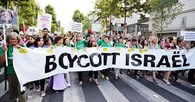
The Palestinian Forum in the United Kingdom said the British governments’ decision to criminalize the government-funded institutions for boycotting Israel is a violation of the simplest rules of democracy and human rights.
In a statement on Tuesday, the forum stressed the fact that boycotting Israel is a human right that cannot be confiscated.
The forum also called on parliamentarians and friends of Palestine amongst British parties to work on revoking the decision via the British House of Commons and the Supreme Court since it is considered a violation of human rights as stipulated in the European convention for human rights in addition to other international conventions signed by the UK.
In a statement on Tuesday, the forum stressed the fact that boycotting Israel is a human right that cannot be confiscated.
The forum also called on parliamentarians and friends of Palestine amongst British parties to work on revoking the decision via the British House of Commons and the Supreme Court since it is considered a violation of human rights as stipulated in the European convention for human rights in addition to other international conventions signed by the UK.
23 feb 2016
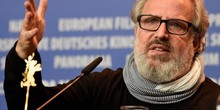
Israeli film-director Udi Aloni, 56, who won the top audience at Berlin Film Festival on Saturday, has labelled the Israeli government “fascist” and urged Germany to cease its military support to Israel.
At a Q&A session about his award-winning film Junction 48 hours before being presented with the Panorama Audience Award for best fiction film, Mr Aloni said Germany should stop supporting the “fascist regime of Israel”:
“Merkel does not mention the occupation and sells submarines to Netanyahu to continue such things.”
The 56-year-old also called Israel a “democracy of white people” and added that “in contrast to the [Israeli] prime minister who spreads hatred, my movie spreads love and co-existence.”
By the end of the session, he mentioned the Palestinian hunger-striker Mohammed al-Qiq as an example “non-Jews’ lack of rights in Israel”, saying that Qiq was dying in administrative detention without being accused of committing a crime.
In a response to Aloni’s comments, according to the Israeli Media, the Israeli Culture Minister Miri Regev said that Israel should not fund films that slander it, refering to the financial support that Aloni’s film received from Israel’s Culture Ministry.
“Aloni’s statements were a clear proof that artists who subvert the state, defame it and hurt its legitimacy should not be funded by the tax payer. A sane country should not assist slanderers and denouncers who malign it, immediately after drinking from its coffers,” Regev stated.
The Israeli film director later clarified to Channel 10 that his comments “were directed against the Israeli government and not against the country, which I love. In contrast to the prime minister who spreads hatred, my movie spreads love and co-existence.”
Last year, more than 3,000 artists, including some of the country’s most prominent actors and directors, signed a petition against Ms Regev’s policies.
“Junction 48” – whose is a Arabic-language film that features mostly Palestinian actors – tells the story of a Palestinian rap star and his girlfriend who live near Tel Aviv in the mixed Jewish-Palestinian city of Lod, known until recently as one of the main drug-running centers of the Middle East.Actress Samar Qupty said it should be easy for Palestinians to identify with the movie, even though it depicts people living lives that are radically different from strict Muslim traditions.
Her character, for example, allows a picture of her face to be used on a poster advertising a hip-hop concert, prompting members of her family to say they plan to injure her if she performs.
“It’s still a revolutionary movie because it doesn’t talk about the way we Palestinians are usually represented in the world,” Qupty said.
“We are representing ourselves by the new generation without trying to prove anything to anyone, with our ‘goods’ and ‘bads’,” she told Reuters in an interview. “We are trying to present what is the real new generation trying to do without making the reality looking any better or any worse.”
At a Q&A session about his award-winning film Junction 48 hours before being presented with the Panorama Audience Award for best fiction film, Mr Aloni said Germany should stop supporting the “fascist regime of Israel”:
“Merkel does not mention the occupation and sells submarines to Netanyahu to continue such things.”
The 56-year-old also called Israel a “democracy of white people” and added that “in contrast to the [Israeli] prime minister who spreads hatred, my movie spreads love and co-existence.”
By the end of the session, he mentioned the Palestinian hunger-striker Mohammed al-Qiq as an example “non-Jews’ lack of rights in Israel”, saying that Qiq was dying in administrative detention without being accused of committing a crime.
In a response to Aloni’s comments, according to the Israeli Media, the Israeli Culture Minister Miri Regev said that Israel should not fund films that slander it, refering to the financial support that Aloni’s film received from Israel’s Culture Ministry.
“Aloni’s statements were a clear proof that artists who subvert the state, defame it and hurt its legitimacy should not be funded by the tax payer. A sane country should not assist slanderers and denouncers who malign it, immediately after drinking from its coffers,” Regev stated.
The Israeli film director later clarified to Channel 10 that his comments “were directed against the Israeli government and not against the country, which I love. In contrast to the prime minister who spreads hatred, my movie spreads love and co-existence.”
Last year, more than 3,000 artists, including some of the country’s most prominent actors and directors, signed a petition against Ms Regev’s policies.
“Junction 48” – whose is a Arabic-language film that features mostly Palestinian actors – tells the story of a Palestinian rap star and his girlfriend who live near Tel Aviv in the mixed Jewish-Palestinian city of Lod, known until recently as one of the main drug-running centers of the Middle East.Actress Samar Qupty said it should be easy for Palestinians to identify with the movie, even though it depicts people living lives that are radically different from strict Muslim traditions.
Her character, for example, allows a picture of her face to be used on a poster advertising a hip-hop concert, prompting members of her family to say they plan to injure her if she performs.
“It’s still a revolutionary movie because it doesn’t talk about the way we Palestinians are usually represented in the world,” Qupty said.
“We are representing ourselves by the new generation without trying to prove anything to anyone, with our ‘goods’ and ‘bads’,” she told Reuters in an interview. “We are trying to present what is the real new generation trying to do without making the reality looking any better or any worse.”
|
|
Events of “Boycott of Israel Week” in London have commenced as anti-Israeli occupation posters were hanged inside trains in London, British press reported.
The boycott campaign organizers said that British weapons were used in the Israeli massacres against Palestinians during the last aggression on the Gaza Strip. The posters accused the BBC of bias to Israel, in reporting news, and slammed the G4S British security company, which manages some of the Israeli and Palestinian Authority’s prisons, for protecting and securing discrimination practiced by Israel. |
Over 500 posters were hanged in London's trains and will be seen by over 4 million people on Tuesday, the official of the campaign wrote on Twitter.
18 feb 2016

Already mired in controversy over the lack of non-white nominees for this year’s ceremony, the Oscars goody-bag is now being used to whitewash Israeli apartheid.
The so-called ‘swag bag’, put together by Los Angeles firm Distinctive Assets, includes a $55,000 worth five-star Israeli government funded luxury trip to Israel for every nominee in the main acting and directing categories.
Any Oscar nominee taking up the offer will find themselves working as an unpaid stooge in an extended 10-day photo opportunity on behalf of a government that breaks international law, violates human rights and has been credibly accused of war crimes.
Oscar nominees Mark Rylance and Asif Kapadia have already promised not to visit Israel professionally. Their pledge, along with those of a thousand UK artists and performers, was launched in February 2015.
Rather than whitewash Israel’s systematic oppression of Palestinians, Artists for Palestine UK (APUK) is appealing to the stars and directors on the Academy Awards shortlist to donate Israel’s holiday vouchers to Palestinian refugees, who are denied the right to return to their country.
More than 750,000 Palestinians were systematically ethnically cleansed and made refugees during the establishment of the State of Israel in 1948. Israel has denied their UN-stipulated right to return to their homes of origin for nearly seven decades.
The Palestinian Academic and Cultural Boycott of Israel (PACBI), The Palestinian Performing Arts Network (PPAN), organisations and individuals that represent the majority of the Palestinian cultural sector, has called on Oscar nominees to reject the trip sponsored by the Israeli government included in this year’s Academy gift bag.
PPAN’s members include The Edward Said National Conservatory of Music, Ramallah and Gaza, and The Freedom Theatre, Jenin refugee camp.
Click here to view the full list of signatories to the Artists’ Pledge for Palestine
Artists for Palestine UK is a growing network of artists, cultural workers and activists who want to make a stand in support of justice and equality for the Palestinians. APUK believes that Israel’s campaign to exploit culture as a diplomatic weapon, the ‘Brand Israel’ strategy, requires an urgent riposte from artists of conscience. We set out the arguments for an appropriate ethical and political response in our booklet, The Case for a Cultural Boycott of Israel
The so-called ‘swag bag’, put together by Los Angeles firm Distinctive Assets, includes a $55,000 worth five-star Israeli government funded luxury trip to Israel for every nominee in the main acting and directing categories.
Any Oscar nominee taking up the offer will find themselves working as an unpaid stooge in an extended 10-day photo opportunity on behalf of a government that breaks international law, violates human rights and has been credibly accused of war crimes.
Oscar nominees Mark Rylance and Asif Kapadia have already promised not to visit Israel professionally. Their pledge, along with those of a thousand UK artists and performers, was launched in February 2015.
Rather than whitewash Israel’s systematic oppression of Palestinians, Artists for Palestine UK (APUK) is appealing to the stars and directors on the Academy Awards shortlist to donate Israel’s holiday vouchers to Palestinian refugees, who are denied the right to return to their country.
More than 750,000 Palestinians were systematically ethnically cleansed and made refugees during the establishment of the State of Israel in 1948. Israel has denied their UN-stipulated right to return to their homes of origin for nearly seven decades.
The Palestinian Academic and Cultural Boycott of Israel (PACBI), The Palestinian Performing Arts Network (PPAN), organisations and individuals that represent the majority of the Palestinian cultural sector, has called on Oscar nominees to reject the trip sponsored by the Israeli government included in this year’s Academy gift bag.
PPAN’s members include The Edward Said National Conservatory of Music, Ramallah and Gaza, and The Freedom Theatre, Jenin refugee camp.
Click here to view the full list of signatories to the Artists’ Pledge for Palestine
Artists for Palestine UK is a growing network of artists, cultural workers and activists who want to make a stand in support of justice and equality for the Palestinians. APUK believes that Israel’s campaign to exploit culture as a diplomatic weapon, the ‘Brand Israel’ strategy, requires an urgent riposte from artists of conscience. We set out the arguments for an appropriate ethical and political response in our booklet, The Case for a Cultural Boycott of Israel

